

Section

Back
Herbs for Luck: Boost Your Fortune with 11 Powerful Herbs
02/28/2024 | Written by Kate Tant
Herbal Secrets

Herbs have a long history of medicinal use in Ayurveda, but did you know that traditional practices often include using herbs for luck?
Before discussing how ancient civilizations used spices and herbs for luck, we need to understand how regenerative organic growing methods take into consideration the ancestry of herbs and spices and their significant role in holistic wellness and spiritual practices.
Modern farming practices have depleted the soil, making it difficult for the land to provide abundant yields of healthy herbs and crops. But when nurtured through regenerative organic growing methods, we can rehabilitate the soil, allowing herbs to thrive while giving credit to the traditional wisdom and lineage of the plant.
Like other living plants, herbs and spices are infused with vital energy. Living herbs, particularly, emanate positive energy that attracts optimistic vitality in all areas of modern life.
What Is the Spice for Luck?
Cinnamon is the ultimate spice for luck. An energizing and stimulating spice, it promotes a sense of vitality and productivity, making it a foundational herb for building abundance. Many believe cinnamon has a high energetic vibration that attracts money and good luck.
It is often used in rituals for prosperity to draw luck and wealth into the home. For instance, one ritual involves blowing a dusting of cinnamon across the threshold and into the house at the beginning of a new month. The timing is crucial as each new month marks the start of a new cycle, making it the perfect opportunity to invite positive energy and abundance. Another practice involves carrying a stick of cinnamon with you or placing a cinnamon stick in your wallet to attract wealth.
A comforting, warm, sweet spice, Cinnamon is a pantry staple in most homes. Once deemed more valuable than gold, the use of cinnamon dates back to ancient Egypt, where Egyptian embalmers used it for mummification and religious practices. It was also used in cooking to season dishes. Today, cinnamon is celebrated for its flavor and health benefits, including supporting a healthy inflammatory response and maintaining regular blood sugar levels.
Does cinnamon really bring good luck? Behind every wellness or spiritual practice lies a belief that it will work. It won’t work if you don’t believe the practice will bring good luck. But if you believe in the luck of cinnamon, try adding visualization and affirmations to the practice. Visualize new opportunities and abundance coming your way. The key is to lean into something that resonates with you, like a goal you’d like to accomplish during the month.
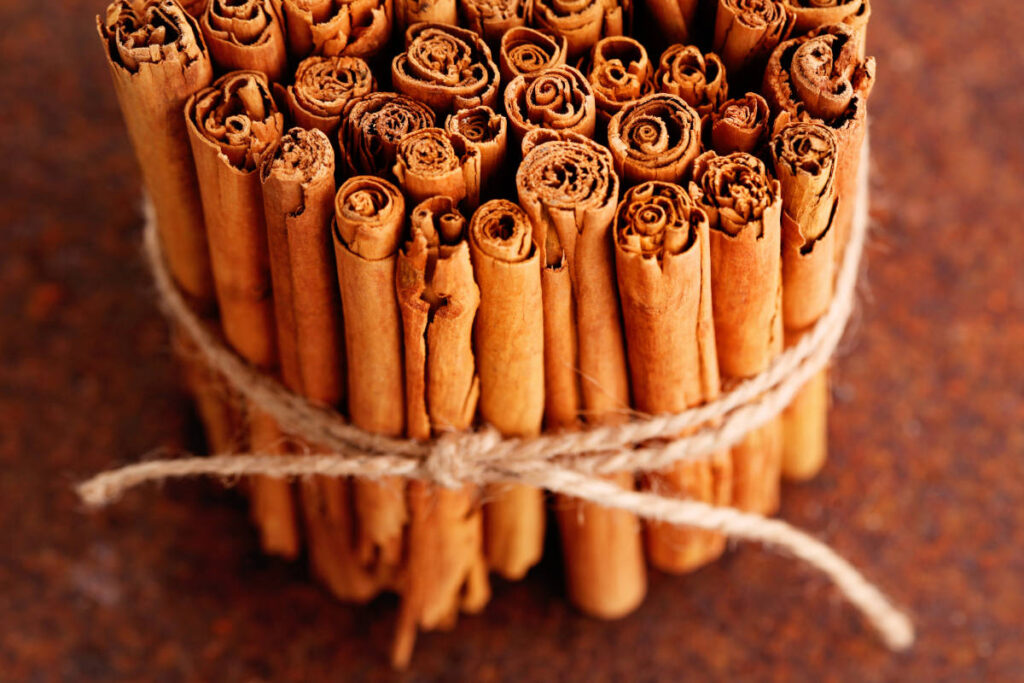
What Is the Herb for Luck?
Two of the top herbs for luck are basil and Holy Basil. While basil and Holy Basil both belong to the Lamiaceae, or mint, family, these sister herbs have different properties.
Basil, with its lush, aromatic green leaves, is a Mediterranean herb used primarily in Italian dishes. Its flavor profile is sweet and savory, with hints of mint and pepper.
In Feng Shui, basil holds the power to repel bad energies while generating abundance, prosperity, and fortune.
Holy Basil is an Asian herb also known as Tulsi. Like basil, it has a minty flavor, but with notes of clove and lemon. It has a warm and sweet taste, making it perfect for teas and Thai cuisine.
Holy Basil holds a respectful place in Hindu culture, where it is regarded as the manifestation of the goddess Lakshmi. She is the goddess of fortune, prosperity, wealth, and fertility. Holy Basil is believed to impart blessings of prosperity, wealth, and luck in any home where it resides. It is a common practice to use fresh and dried Holy Basil for spiritual practice.
Although basil and Holy Basil are known to bring good fortune, they aren’t the only herbs to do so. In Ayurvedic traditions, many herbs are revered and honored for their energetic components.

11 Herbs for Luck
Now that we’ve learned the best spice and herb for luck let’s explore the mystical properties of eleven herbs known for bringing luck in both traditional and contemporary contexts. You’ll immediately recognize a few of these herbs for luck, while some might surprise you.
1. Basil
We introduced basil as one of the top herbs for luck. This versatile herb is celebrated in Italian cuisine for its robust flavor profile. Traditionally, it has been associated with love, fertility, and protection. History suggests Roman brides carried basil and thyme in their bouquets to entice good luck and encourage fertility.
2. Holy Basil
Holy Basil is more than just a culinary staple in Indian cuisine. Known as Tulsi or “Queen of Herbs,” it is revered as a sacred herb and symbol of hospitality. It is grown in many Indian households for its purifying and protective properties. It embodies spiritual purity. Holy Basil is a powerful adaptogen used in modern wellness practices, easing stress and supporting the immune system.
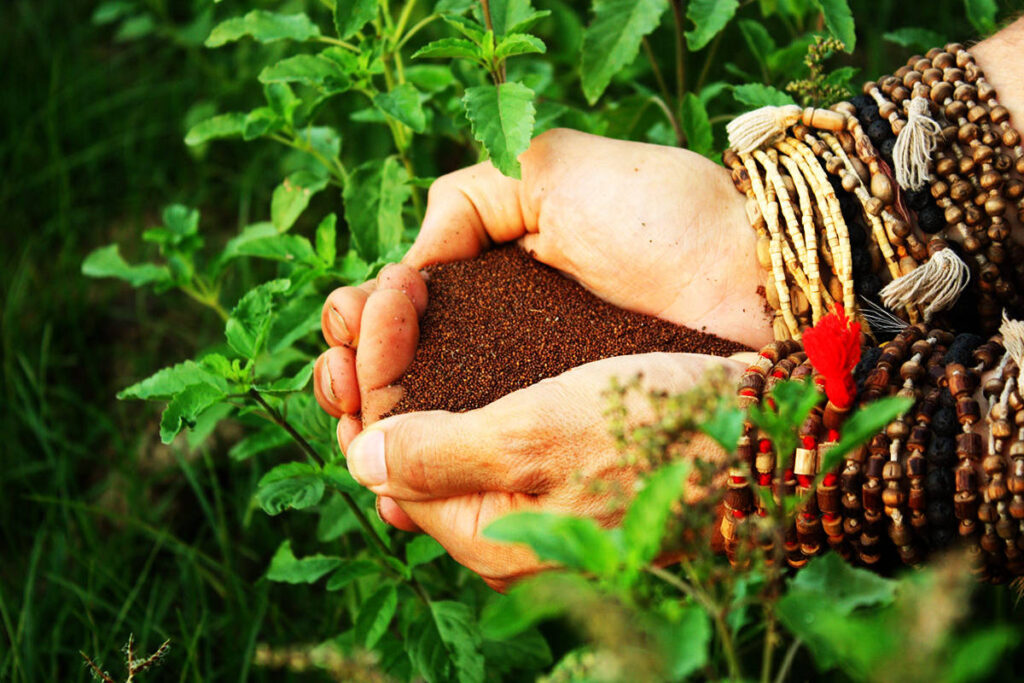
3. Ginger
Ginger is among the most invigorating spices and is considered a powerful herb for inviting success, wealth, and opportunity. It’s also regarded as a protective herb, warding off negative energies. To ensure safe travels, place ginger in your pocket or wallet or hang it from doorways and windows to repel negative energy.
Today, ginger is widely used for its digestive benefits and as a natural immune booster. It helps to support digestion, relieve gastrointestinal discomfort, and flush toxins from the body. You can eat ginger raw and add it to teas, like our Tulsi Lemon Ginger tea. It can be cooked into sweet or savory dishes or taken as a supplement.
4. Mint
Mint is an energetic herb with a refreshing aroma. Throughout history, it has been used as a symbol of hospitality to welcome guests. Keeping mint in your home moves stagnant energy and increases vitality. Because of its energy-moving properties, it is believed to stimulate the mind, thereby attracting financial success. Today, mint is a popular herb in the culinary arts.
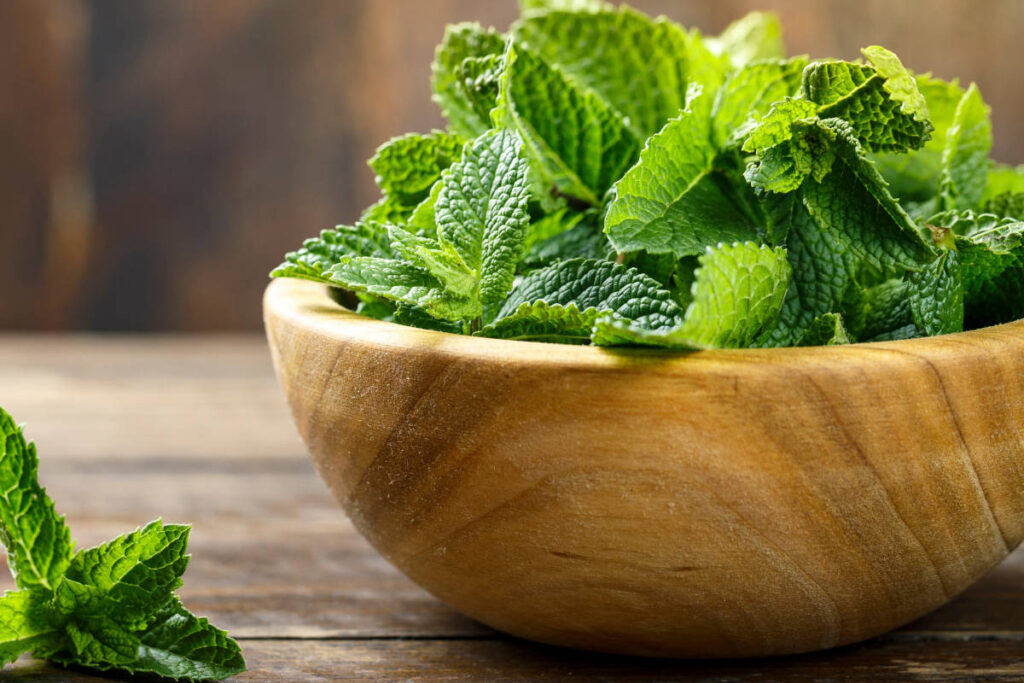
4. Cinnamon
As mentioned earlier, cinnamon is the spice of luck, attracting prosperity and abundance. It removes negative energies while inviting positive energy and financial wellness. Its warm, sweet aroma enhances both sweet and savory dishes, while its therapeutic properties offer numerous health benefits.
Cinnamon is a multifaceted spice that has withstood the test of time. To bring abundance into your home, look for ways to use cinnamon in your cooking or try the ritual of gently blowing a pinch of cinnamon across the threshold of your front door.
6. Chamomile
Chamomile is best known for its calming and soothing properties. But it’s also a symbol of luck and prosperity. Ancient civilizations like the Egyptians, Greeks, and Romans used chamomile as a healing treatment. In South American traditions, making a garland of Chamomile flowers to wear as a crown may attract luck and love.
In our modern world, we use chamomile therapeutically to promote relaxation and aid in sleep quality. It also supports a healthy immune system and inflammatory response. At ORGANIC INDIA USA, we have an assortment of organic chamomile infusions to help you on your wellness journey.
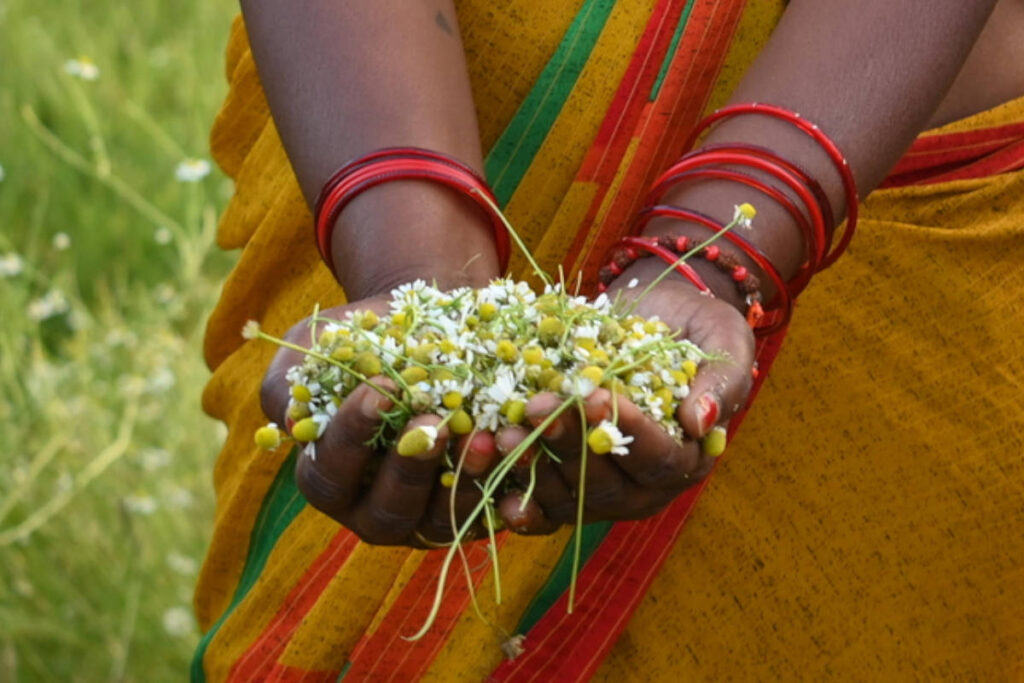
7. Calendula
With its vibrant golden petals, calendula is known as “pot marigold.” Calendula symbolizes joy, love, and affection. The petals are often used in marriage ceremonies to bestow luck upon the newlyweds, protecting them from envy. Associated with the sun and its warmth and joy, it brings positive energy and good luck. In medieval Europe, people believed it possessed magical properties and often used it to attract positive energy.
To make a tea with therapeutic properties, steep calendula flowers in boiling water. Calendula extract can be found in topical ointments and tinctures to soothe irritations and improve skin health.
8. Patchouli
With its rich, earthy aroma, patchouli is a powerful grounding herb used for centuries in spiritual practices and rituals. Patchouli oil is believed to enhance spiritual connection and understanding while attracting wealth and prosperity. When used in meditation practice, it grounds and balances the chakras.
Today, patchouli oil is used in aromatherapy as a harmonizing tonic to calm the senses, reduce stress, and promote relaxation. Add a few drops to your daily moisturizer or another carrier oil like jojoba, grapeseed, or almond oil to smooth out skin irritations.
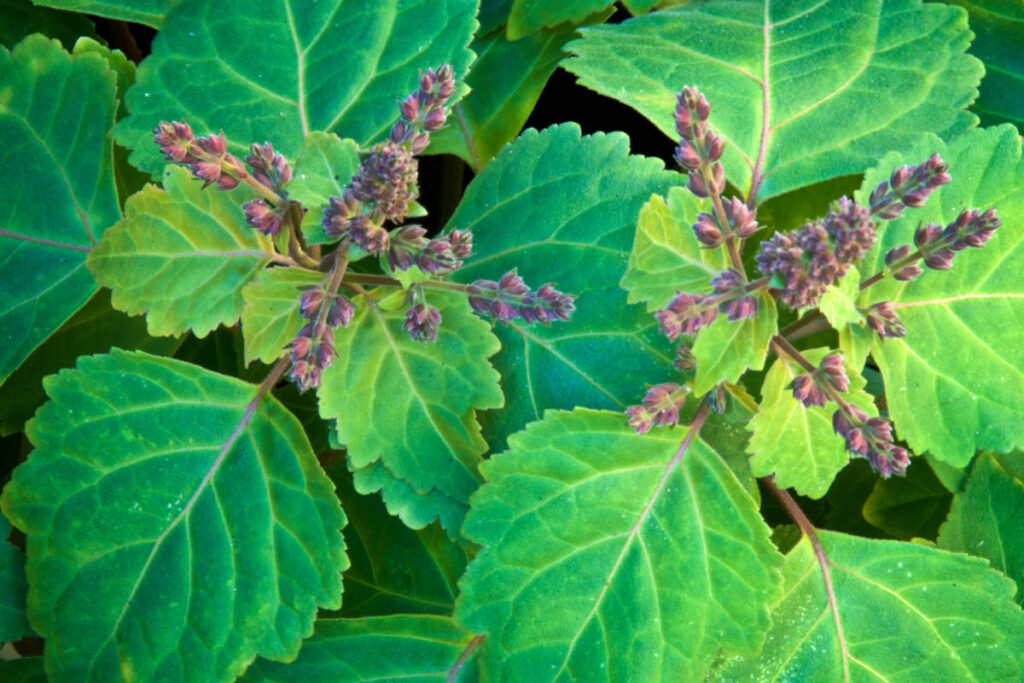
9. Cloves
An essential kitchen spice, especially around autumn, cloves are an aromatic spice with a subtly sweet flavor that pairs well with other slightly sweet spices like cinnamon, nutmeg, and allspice. According to Hindu tradition, cloves’ gentle warming properties ward off the evil eye’s ill effects and strengthen a positive aura.
Due to its antibacterial properties, you can use this simple spice in many home remedies to aid digestion, relieve dental discomfort, and support respiration.
10. Irish Moss
Technically, Irish moss isn’t an herb. Instead, it’s a type of seaweed that grows in tidepools and inlets along the coastlines of Europe and North America. It comes in different colors, from dark purple to greenish-yellow, and is rich in iodine and trace minerals.
When carried in your pocket, it is believed to increase luck and the steady flow of money, especially in maritime cultures. It can be a good luck charm while traveling as it may act as a talisman for protection and safety.
In modern wellness applications, studies suggest it can boost the immune system and support a healthy thyroid. Its panel of vitamins and minerals gives it the distinction of a superfood.
11. Clover
The four-leaf clover is universally recognized as a symbol of good luck and has been the subject of fascination and a sign of good fortune for centuries. Folklore suggests the Celts, who lived in Western Europe, used clover as a charm against evil spirits. The rarity of finding a four-leaf clover could also contribute to its lucky charm.
Beyond its symbolic esteem, clover provides beneficial ground cover for soil and is used in green agricultural practices to enhance soil health. In herbal medicine, clover is appreciated as a natural detoxifier and supports a healthy inflammatory response. Add clover leaves to a salad or boil the blossoms to make tea.
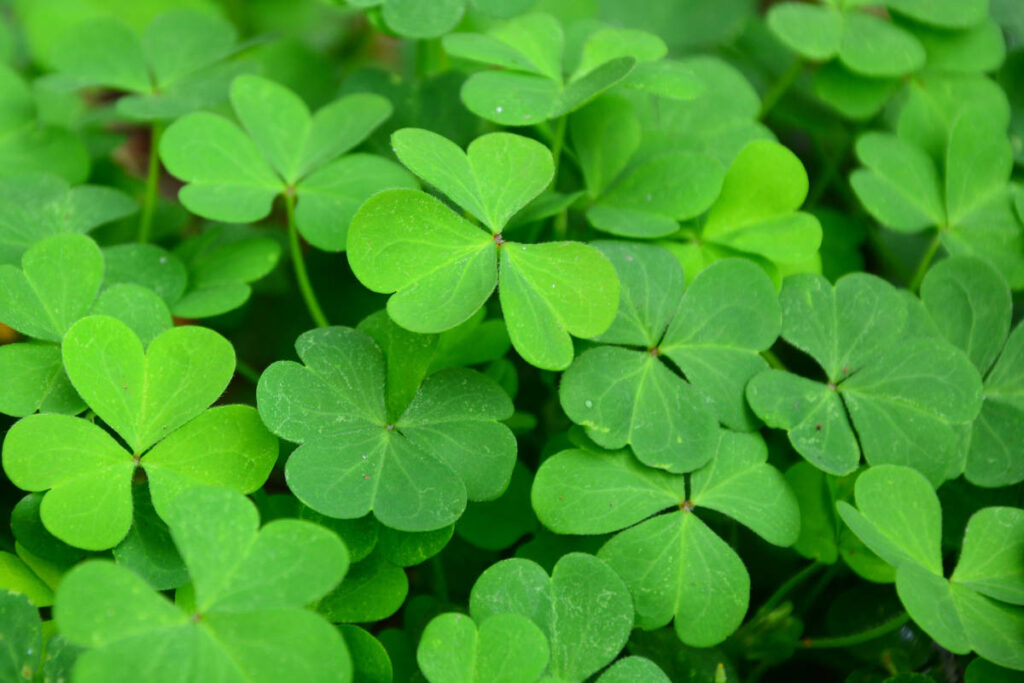
Discover the Power of Herbs for Luck and Well-being
In the world of herbs, each plant carries its own story of cultural significance as unique and varied as the treasure trove of flavors, aromas, and health benefits it holds. From the warming spices of cinnamon and cloves to the refreshing fragrance of mint and Holy Basil, these eleven herbs for luck weave together traditional wisdom with a wealth of modern wellness applications.
Incorporating these herbs and spices into your daily wellness routine can be an enriching experience. If you’re looking to embrace the full potential of these lucky herbs, exploring organic, ethically sourced options ensures personal health benefits and pays homage to the preservation of traditional regenerative organic growing methods.
Embrace the power of ORGANIC INDIA USA’s herbal supplements and invite luck, prosperity, and wellness into your life. Allow the ancient wisdom of these eleven lucky herbs to guide you toward a more harmonious and balanced existence.
Now that you have your herbs for luck at the ready, check out these herbs for protection to guard your fortune.

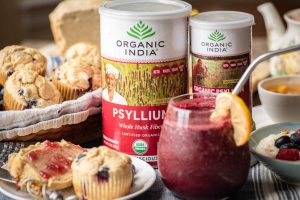
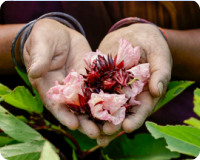



 Kate Tant is a professional health and wellness writer with a strong passion for holistic wellness. Her writing covers topics from Ayurvedic herbs and practices to nontoxic living and intermittent fasting. Her conversational writing style resonates with readers who are looking for help and encouragement when it comes to finding natural solutions to their health.
Kate Tant is a professional health and wellness writer with a strong passion for holistic wellness. Her writing covers topics from Ayurvedic herbs and practices to nontoxic living and intermittent fasting. Her conversational writing style resonates with readers who are looking for help and encouragement when it comes to finding natural solutions to their health.